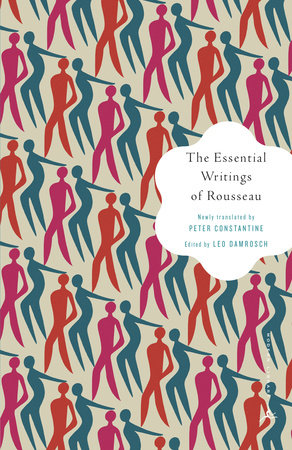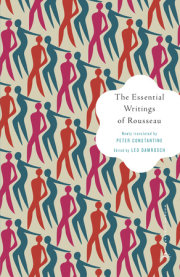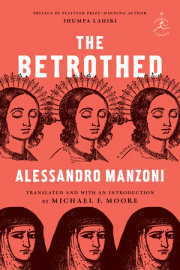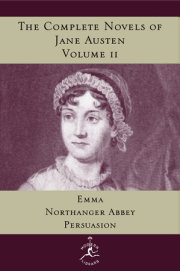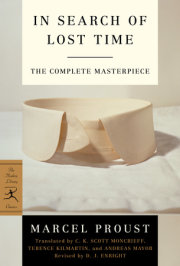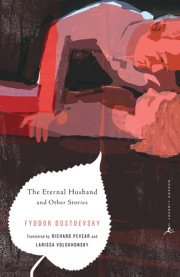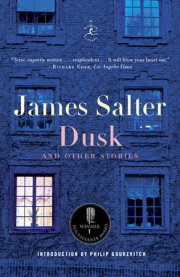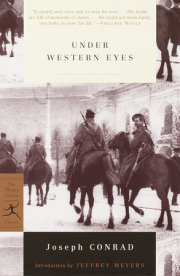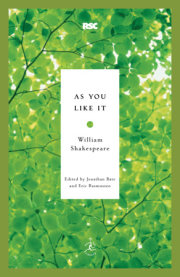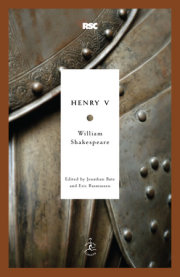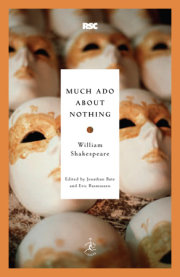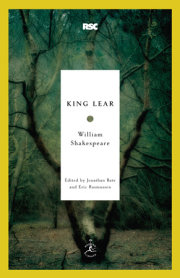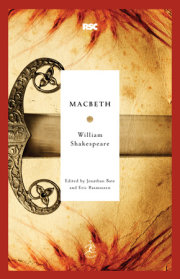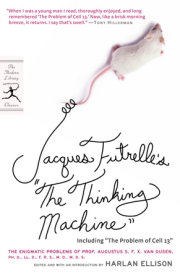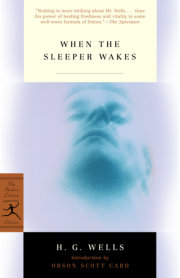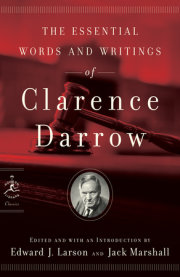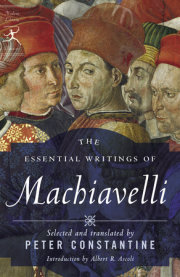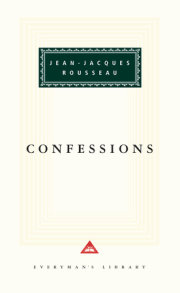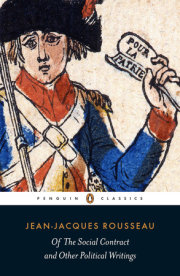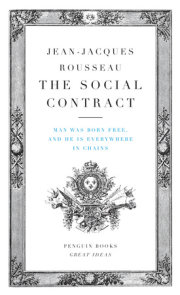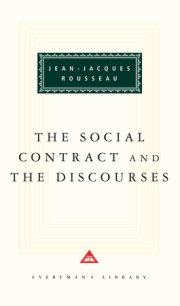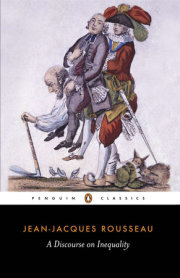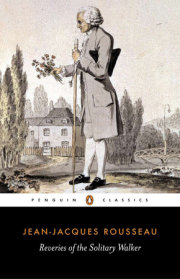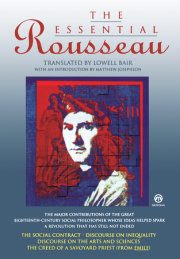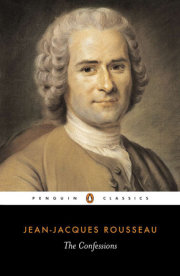Discourse on the Origin and Foundations of Inequality Among Men
It is of man that I have to speak, and the question I shall examine assures that I will be speaking openly, as one does not propose such questions to one's fellow men when one is afraid of honoring the truth. I will, therefore, defend the cause of humanity with confidence before the wise men who invite me to do so, and shall be pleased if I prove worthy of my subject and my judges.
In my view there are two sorts of inequality in the human species: one I call natural or physical, because it is established by nature and consists of differences in age, health, physical strength, and qualities of the mind or soul; the other, one might call moral or political inequality, because it depends on some sort of mutual agreement, and is established, or at least authorized, by the consent of men. This inequality consists of the various privileges that some enjoy at the expense of others, such as being wealthier, more honored, and more powerful than they, or even making themselves obeyed.
One cannot ask what the source of natural inequality is, because the simple definition of the term would be provided as an answer. Even less can one inquire if there is not some essential connection between the two inequalities, for that would be to ask in different terms if those who command are necessarily better than those who obey, and if the power of the body or the mind, and wisdom or virtue, are always found in the same individuals in proportion to their power or wealth: this is a good question, perhaps, in a debate among slaves within earshot of their masters, but it is not fitting for free men of reason who are engaged in a quest for truth.
What, then, is this discourse about? Its aim is to mark within the progression of things the moment in which rights succeeded violence, and nature was subjected to law; to explain by what sequence of miracles the powerful might resolve to serve the weak and the people purchase an imaginary repose at the price of true happiness.
All the philosophers who have examined the foundations of society have felt compelled to go back to the state of nature, but not one has succeeded. Some have not hesitated to suppose that men living in a natural state had the notion of what was just and unjust, without troubling to show that they must already have had that notion, or even that it would have been useful to them to have it. Others have spoken of a natural right that each individual has to protect what belongs to him, yet without explaining what they understand by belongs. Others again, after first granting authority to the more powerful over the weaker, immediately created a government without giving thought to the time that had to elapse before the words authority and government could attain meaning among men. Finally, all the philosophers, speaking constantly of need, greed, oppression, desires, and pride, imbued the state of nature with ideas they had found in society. They spoke of savage man but depicted civilized man. It did not even occur to most of our philosophers to doubt that the state of nature once existed, whereas it is evident from the Holy Scriptures that the first man, having instantly received intellect and precepts from God, was himself not in a state of nature at all; and if one gives the writings of Moses the credence that every Christian philosopher owes them, one must say that even before the Deluge men never existed in a pure state of nature, unless they lapsed into it by some extraordinary occurrence; a paradox that is most difficult to defend and altogether impossible to prove.
Let us therefore begin by setting aside all the facts, for they do not touch on the problem.20 One must not take the inquiries into which one can enter on this subject as historical truths, but merely as hypothetical and conditional reasoning. These are better suited to elucidate the nature of things than to show their true origin, and are comparable to the hypotheses that our natural scientists make every day on the formation of the world. Religion commands us to believe that God Himself drew men out of the state of nature immediately after the Creation, and that men are unequal because he willed them to be so. But religion does not forbid us to form conjectures drawn exclusively from the nature of man and the creatures surrounding him, or to conjecture what might have happened to mankind had it been left to itself. This is what I am asked, and this is what I intend to examine in this discourse. Since my subject concerns man in general, I will strive to adopt a language suited to all nations, or, rather, forgetting times and places in order to think only about the men to whom I am speaking, I shall imagine myself in the Lyceum of Athens, repeating the lessons of my masters, having as my judges Platos and Xenocrateses, and mankind as my auditors.21
Listen, O man, from whatever country you may be, whatever your opinions! Here is your history such as I believe to read it, not in books written by your fellow men, who are liars, but in nature, which never lies. Everything that comes from nature will be true. Nothing will be false, except what I might unintentionally have included of my own. The times of which I shall speak are very distant. How much you have changed from what you once were! It is, so to speak, the life of your species I will describe to you according to the qualities that you have received, and that your education and your habits have been able to corrupt but not destroy. There is, I believe, an age at which an individual might want to stop growing older; you will look for the age at which you wish your species to have gone no further. Discontented with your present state for reasons that herald even greater discontent for your unfortunate posterity, you might perhaps wish to be able to go back in time. And this sentiment must lead to the praise of your first ancestors, the criticism of your contemporaries, and dread for those who will have the misfortune of living after you.
Part One
As important as it might be to consider man from his origins in order to judge his natural state, and examine him, so to speak, in the original embryonic state of his species, I will not follow his development through its successive stages. I will not pause to search in his biology for what he might have been at the beginning in order to eventually become what he is now. I will not examine if, as Aristotle believes, man's elongated nails might originally have been hooked claws, if he was hairy like a bear, and if, walking on all fours, his eyes directed at the ground and confined to a few paces ahead, whether this did not shape the character and also the limits of his ideas. On this question I could form only vague, almost imaginary, conjectures. Comparative anatomy has still made too little progress, and the observations of natural scientists are still too uncertain, to allow for a solid foundation on such a subject. Thus, without turning to supernatural knowledge on this subject, and without regard to the changes that have taken place in man's inner and outer form as he gradually began to apply his limbs to new uses and to nourish himself on new foods, I will assume him to have always had the form I see him having today, walking on two feet, making use of his hands as we make use of ours, directing his eyes at all of nature and surveying with them the vast expanse of heaven.
In stripping this being, constituted as he is, of all the supernatural gifts he might have received, and of all the artificial faculties that he could have acquired only by a long progress; in considering this being, in short, such as he must have emerged from the hands of nature, I see an animal that is less strong than some, less agile than others, but, in sum, formed in the most advantageous way of all. I see him satisfying his hunger beneath an oak, quenching his thirst at the first stream, making his bed beneath the same tree that furnished him his meal--thus his needs are satisfied.
Abandoned to its natural fertility and covered by immense forests that the ax had never mutilated, the earth offers at every step food and shelter to animals of every species. Men, dispersed among them, observe and imitate their industry and thus raise themselves to the instinct of beasts, with the advantage that each species has merely its own instincts, while man, having perhaps none that are his own, appropriates them all, nourishing himself equally on a wide selection of foods that other animals share, consequently finding his sustenance with greater ease than any of the others.
Copyright © 2013 by Jean-Jacques Rousseau. All rights reserved. No part of this excerpt may be reproduced or reprinted without permission in writing from the publisher.

